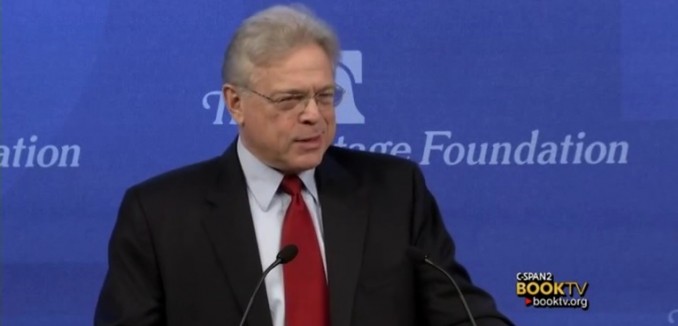Rather than preventing war, the nuclear agreement with Iran, known as the Joint Comprehensive Plan of Action (JCPOA), will stoke Tehran’s regional ambitions and increase the likelihood of a major regional conflict, Joshua Muravchik, a distinguished fellow at the World Affairs Institute, wrote yesterday in an analysis for The Weekly Standard.
Muravchik argued that wars are most likely to break out when liberal democracies don’t challenge the designs of “expansionist dictators,” who treat the lack of reaction as encouragement “to overreach.” Noting that Iran is currently “the principal expansionist power” in the Middle East, with effective control of Lebanon and parts of Syria, as well as significant influence in Iraq, Muravchik wrote that the nuclear agreement will further expand Iran’s reach and drag America into another war in the Middle East.
Obama’s nuclear agreement will stoke Iran’s ambitions in three ways. First, the lifting of sanctions will provide Tehran an infusion of funds, estimated by some experts as $150 billion although Obama puts the figure at $56 billion by counting only the sums of Iranian money frozen in foreign banks, not any of the new profits and investments that will be undammed. Whatever the number, it means billions for Iran’s Revolutionary Guards and its proxies (as well as the apparatus of domestic repression). Second, the agreement will assure that Iran can make nuclear weapons sooner or later. Even a delay of ten years means little in a region where rulers often hold power for thirty and the sense of historical drama sweeps over millennia in a way that it is hard for us denizens of the new world to understand. Iran’s looming nuclear power will begin at once to generate power shifts as well as threats, accommodations and counteractions. Third, Iran and its proxies feel they have won a victory over the West. Iran secured “more than what was imagined,” boasted President Rouhani, while the leader of Hezbollah’s bloc in Lebanon’s parliament exulted that thanks to the nuclear agreement, “Iran is now a superpower” that has “succeeded in humiliating the world’s ruling powers.”
All this means Iran will grow more daring and aggressive, perhaps leading to more direct conflict with its archrival, Saudi Arabia, whose alarm at the nuclear deal may well equal Israel’s although it is expressed less volubly. Already Tehran and Riyadh are at war in Yemen, in part through proxies but also with their own forces. There are numerous imaginable flashpoints at which this could intensify. Iran’s Yemeni allies, tutored by Hezbollah, could strike on Saudi territory. Bahrain’s restive Shiite majority could rise against their Sunni monarch and Saudi forces would intervene, but now an emboldened Iran, which claims Bahrain as its own territory, might take action on the other side. In Saudi Arabia itself, Iran has in the past stirred revolt among the Shiite minority, ten percent of the population concentrated in the east where the oil is. In short, a more direct and violent Iranian-Saudi confrontation is easily imaginable. The United States, which sent half a million soldiers to rescue Kuwait from Iraq, would do anything in its power to defend Saudi Arabia from Iran.
In recent months, quite a few experts — including Washington Post Deputy Editorial Page Editor Jackson Diehl, Foreign Policy editor David Rothkopf, former State Department official Aaron David Miller, Washington Institute of Near East Policy fellows Mehdi Khalaji, Soner Cagaptay and James Jeffrey, and former Secretaries of State Henry Kissinger and George Shultz — have similarly predicted that the nuclear deal will directly encourage further Iranian aggression in the Middle East.
[Photo: BookTV / YouTube ]




